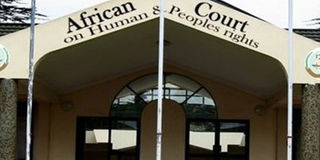African Court needs expanded legal mandate to handle corruption cases

What you need to know:
- But the fight against corruption would not lose steam
- Pressure to extend the jurisdiction to cover crimes against humanity
Arusha. The African Court on Human and People's Rights (AfCHPR) will take on cases against corruption only if its jurisdiction is extended to include anti-graft fight.
"Our mandate so far is confined to cases with bearing on human rights violations," affirmed Justice Sylvain Ore, the President of the judicial organ of the African Union based here.
He said although grand corruption can lead to human rights violations through denial of segregated people of their resources, time has not come for the Court to handle such cases.
"The Court will deal with cases (against corruption) only when our jurisdiction is extended. Presently, I cannot say if cases we are handling have elements of corruption. It depends on the way you take them", he stated.
Justice Ore was speaking to journalists on Friday, October6, after the visit to the Court by Begoto Miarom, the chairperson of the African Union Advisory Board on Corruption (AU-ABC), another AU organ based in Arusha.
He admitted corruption was one of the challenges facing the African continent and that the Court would extend the necessary support to the Board in pursuit of justice.
However, he insisted that the jurisdiction of AfCHPR was still confined to human rights violations as the Protocol for its establishment says.
Pressure to extend the jurisdiction to cover crimes against humanity and war crimes have not borne fruit apparently because African states have not unanimously agreed on the proposal.
Speaking to reporters after subsequent talks with the Court officials Mr. Miarom, neverthelesss, stressed the need for the two organs to fight the two vices - corruption and human rights violation - due to their negative role for development in the continent.
"We need Africa without corruption and human rights violations in equal measure", he said, noting that it would be in the interests of the continent if graft cases were taken up by the Arusha-based Court.
However, Mr Miaron said the fight against corruption would not lose steam because AU has declared 2018 African Year of Anti-Corruption in a bid to intensify the fight.
During the period, the state parties would be expected to adopt measures and actions to prevent, detect, punish and eradicate corruption and related offences.
"AU dedicated 2018 as the 'African Year of Anti-Corruption' due to the escalating level of graft in the continent, mostly involving the top officials", he pointed out.
The establishment of AU-ABC in May 2008 emanated from Article 22 (1) of the AU Convention adopted during the AU Summit in Maputo, Mozambique in July 2003 and which entered into force in August 2006.




